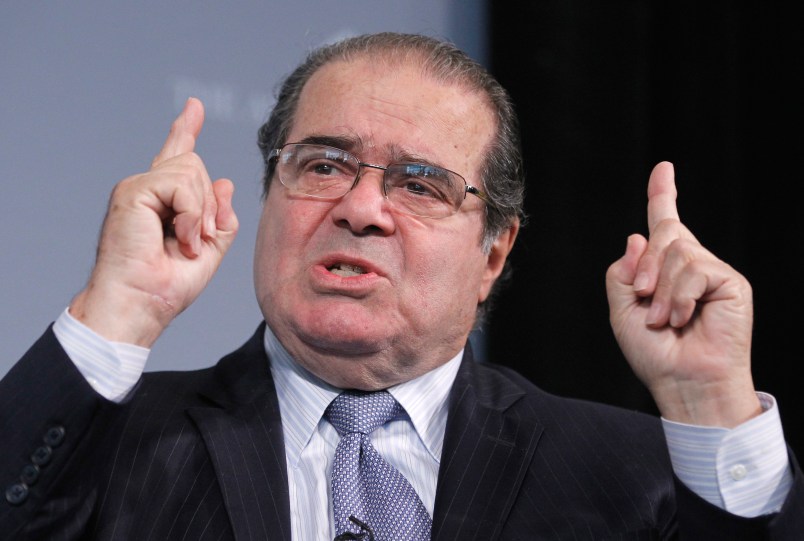It’s not often that a Supreme Court justice makes a factual blunder in a formal opinion.
Legal experts say Justice Antonin Scalia erred in his dissent in the 6-2 decision Tuesday to uphold the Environmental Protection Agency’s authority to regulate coal pollution that moves across state lines. The Reagan-appointed jurist argued that the majority’s decision was inconsistent with a unanimous 2001 ruling which he mistakenly said shot down EPA efforts to consider costs when setting regulations.
“This is not the first time EPA has sought to convert the Clean Air Act into a mandate for cost-effective regulation. Whitman v. American Trucking Assns., Inc., 531 U. S. 457 (2001), confronted EPA’s contention that it could consider costs in setting [National Ambient Air Quality Standards],” Scalia wrote in his dissent, which was joined by Justice Clarence Thomas.
The problem: the EPA’s position in the 2001 case was exactly the opposite. The agency was defending its refusal to consider cost as a counter-weight to health benefits when setting certain air quality standards. It was the trucking industry that wanted the EPA to factor in cost. The 9-0 ruling sided with the EPA. The author of the ruling that Scalia mischaracterized? Scalia himself.
The conservative justice’s error was noted by University of California-Berkeley law professor Dan Farber, who called it “embarrassing” and a “cringeworthy blunder.”
“Scalia’s dissent also contains a hugely embarrassing mistake. He refers to the Court’s earlier decision in American Trucking as involving an effort by EPA to smuggle cost considerations into the statute. But that’s exactly backwards: it was industry that argued for cost considerations and EPA that resisted,” Farber wrote on the environmental law and policy blog Legal Planet. “This gaffe is doubly embarrassing because Scalia wrote the opinion in the case, so he should surely remember which side won! Either some law clerk made the mistake and Scalia failed to read his own dissent carefully enough, or he simply forgot the basics of the earlier case and his clerks failed to correct him. Either way, it’s a cringeworthy blunder.”
Doug Kendall, the president of the Constitutional Accountability Center, a liberal legal advocacy group, said the error was mystifying and very unusual for a Supreme Court justice.
“It is a mind-blowing misstatement of a basic fact of the American Trucking Association ruling which Justice Scalia himself wrote. And it’s not just a stray passage — it’s the basis for an entire section of the dissent,” Kendall said. “It is very unusual to see a passage that so clearly misstates the fundamental facts of a prior ruling, especially one written by the justice himself.”
UPDATE: 9:15 A.M. ET
As of Wednesday morning, the Supreme Court has corrected Scalia’s opinion. The relevant passage now excludes his erroneous mention of the EPA and replaces the header with a new one that drops an EPA reference.
The new passage reads as follows: “This is not the first time parties have sought to convert the Clean Air Act into a mandate for cost-effective regulation. Whitman v. American Trucking Assns.,Inc., 531 U. S. 457 (2001), confronted the contention that EPA should consider costs in setting NAAQS.”
The old header was, “Plus Ça Change: EPA’s Continuing Quest for Cost-Benefit Authority.” The new one reads, “Our Precedent.”
The case is EPA v. Homer City Generation. The original opinion — before the corrections — is available below.







Can’t write a dissenting opinion without coming up with at least something.
If you allow hysterical ideology to infect your mind, then this is the result.
Scalia needs to resign.
We all make mistakes, but this is a mistake made by a man who forgot his own ruling–which wasn’t that long ago–and he’s got a slew of highly skilled clerks to help him.
Scalia has always said that once he could no longer properly perform his duties as justice, he’d step down. I’m not going to say he’s senile, because that’s a strong word, and while some of the things that come out of his mouth lately strike me as demented, that doesn’t mean he’s got actual dementia.
However, I note in passing that both his parents died when they were just a little older than him. The odds of him being one of those guys who makes it to 90 with all his marbles are basically zero.
One of his parents–forget which–died of a stroke. But not all strokes are fatal, or even that noticeable. A fairly serious stroke can occur during sleep, and go undetected. Major changes to one’s mental processes can be caused by such a stroke, and you don’t even know it.
Scalia just doesn’t seem right lately–I’ve always disagreed with him, but he seemed coherent in his opinions. Lately, not so much.
justice scalia is an epic blunder as a jurist
Hundreds of lawyers all over the United States will rejoice today; anyone who has ever been on the receiving end of Scalia’s condescending sarcasm. And I guess that one or two law clerks in Scalia’s chambers will have a very unpleasant day…